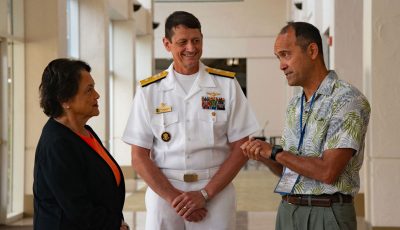Balikatan ni kabalen sa balangay

English: U.S. Marines help displaced Philippine nationals from the back of a KC-130J Super Hercules at Vilamor Air Base, Manila, Republic of the Philippines Nov. 11. Super Typhoon Haiyan has impacted more than 4.2 million people across 36 provinces in the Philippines, according to the Philippine government’s national disaster risk reduction and management council.
From Wikipedia Commons (http://en.wikipedia.org/wiki/Typhoon_Haiyan)
My initial feed to colleagues who were curious for news on Yolanda—Haiyan in the international winds—who left her devastating trail behind in Tacloban City, was the initial count of a hundred casualties, with a sad note of the many unattended bodies by the wayside. In 24 hours, that number would climb to 10,000 and rising. We have a tragic disaster of major proportions on our hands.
The wording on our title deliberately mixes local tongues if only to signify that the situation at hand is more than just a localized calamity. In fact, it is more than an assault on our national awareness. Pinoys around the world are mobilizing resources to quickly get the “deed where there is a need.” They may do some personal accounting and inventory in the process.
The Philippines is a nation lorded over by landlords who benefited from the inequitable distribution of land from Spanish haciendas, tolerated by benign U.S. governance since they needed local counterparts to run their business interests, and let “local” consent front its military designs. Were it not for the millions of Filipinos in diaspora diligently remitting part of wages earned outside of the country, the economy would have gone the way of Mt. Pinatubo long time ago.
Trace family lineage in the names of leaders today and compare them to the ones during the 1935 Commonwealth government; one would recognize that there has not been much of a substantive change. Devastations of any kind will not change that current arrangement. Nor feeble attempt at scaling the social ladder to carry one’s bench (ma-i-anggat ang sariling banko) is sufficient. A total revamp (to occasion a major paradigm shift) of social relations is in order.
But right now, comparisons and contrasts of philosophical differences and the accuracy of socioeconomic analysis, are not our concern. There is a need for massive delivery of aid efforts, and those who have the means will do best if they keep their efforts near their chests as much as possible, up close and personal. The immediate call is not structural revolution to tinker with the system; it is the rapid mobilization of compassion. If that means working with the social welfare office of the government, so be it!
I bear scars on the structural revolution part. I saw a girl begging in front of the Sto. Niño Cathedral in the ’70s, about the age of my eldest daughter. I resolved from then that whatever efforts I did would redound to the welfare of every child in the region. I am sure my two eldest daughters would have preferred a doting father, but though I kept an eye on their growing up to be self-sufficient, self-reliant, and self-confident, I treated them in the same way as I treated everyone else, distant but fair. They lost a normally warmhearted Dad!
Famine struck Negros a few years later. An Australian ex-priest and I visited one of the hospitals in Bacolod where I saw a fair-skinned child who looked like my eldest (my primal spouse is of German-Welsh lineage out of Chicago). She looked like she was only 4 but was actually 8, skeletal and famished to the bone. I quickly became a poster Dad against poverty.
Two reality checks occurred while on my high horse of structural revolution. While Negros was in the midst of famine, rice was rotting in warehouses in Masbate and Bicol as speculative traders played the market. A second, as a Rotarian in Mactan in the ’80s, we responded to the devastation of a natural calamity, bringing in some 50 containers of relief goods through Cebu’s customs. Buried under the boxes were two brand new Mercedes Benz cars. Greed is no stranger in the company of catastrophe!
The foregoing are not words of caution. It is a call to pay close attention to whatever we do. Those willing to show compassion are doubly responsible to ensure that their relief aids get to the right people. It is not enough to say one contributed to someone’s efforts. This is the immediate need.
The long-term need was overdue yesterday. Those of us who may still carry two passports, one of Uncle Sam’s, are doubly challenged to take the democratic base of our new loyalty seriously. I do not mean voting during elections and performing volunteer duties through our favored NGOs. I mean fully participating in the democratic process, including the devolution of decision-making so that a “central” command would be unnecessary to meet common requirements.
The White House and Malacañang, Congress and the Batasan, were necessary when it took efforts to bring reps from outlying regions into the capital city, but with current modes of transport and communication, it is no longer necessary to concentrate so much power on a handful of places in the purview of a few. Greed, after all, multiplies faster under confined environments.
We need a massive reexamination of ourselves as individuals and groups, in the context of a globe that has shrunk to manageable size. The Pinoy in diaspora is called upon to do that right now while packing the relief goods.





















